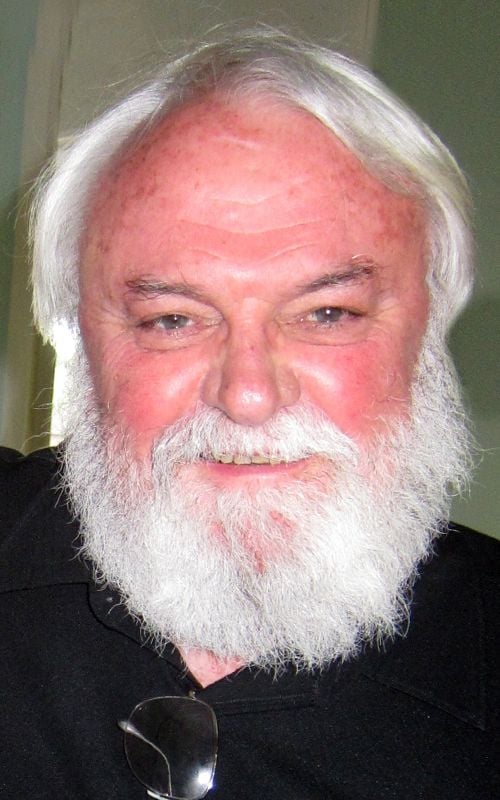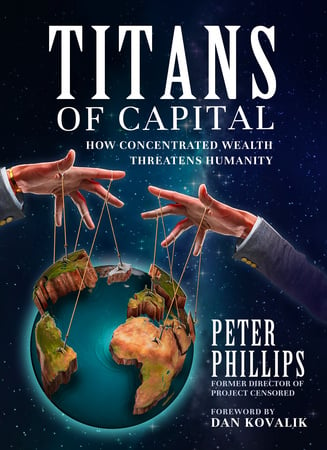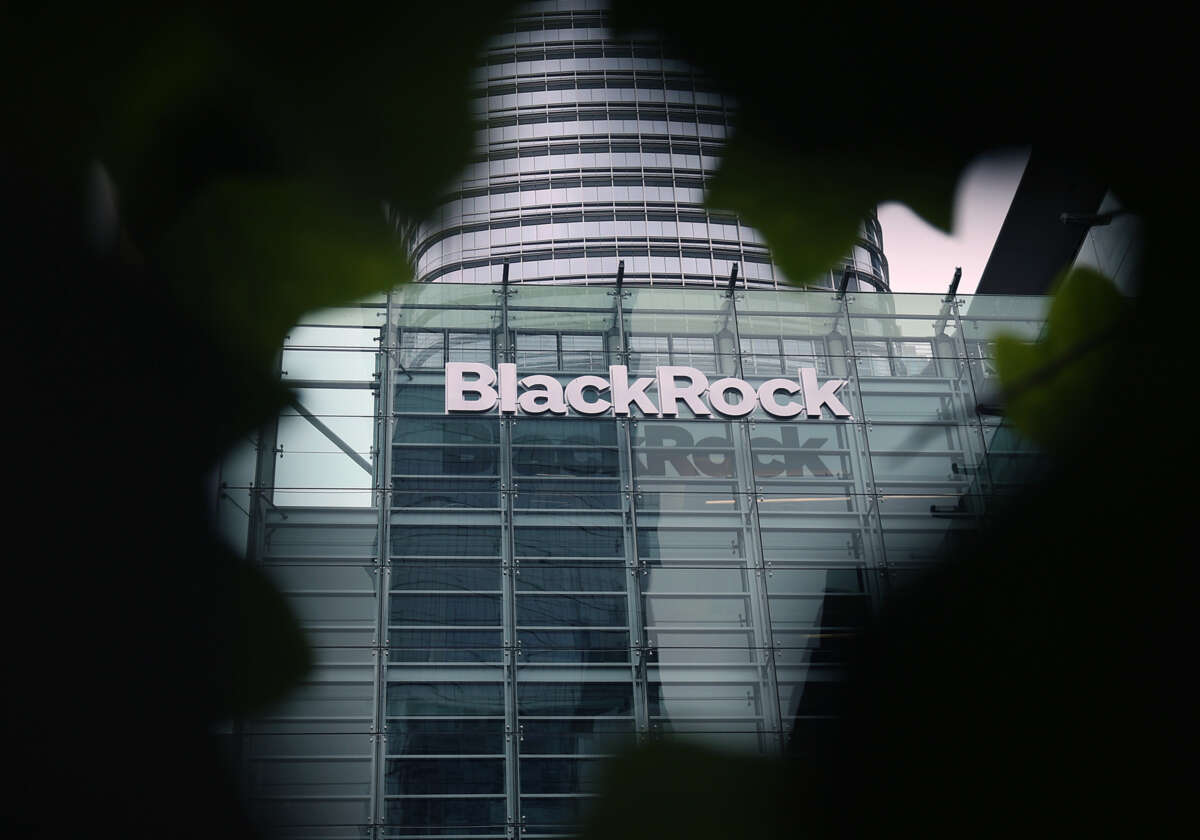The top 10 asset management firms now control $50 trillion of global wealth. They answer to no one but the ultrarich — the 0.05 percent — whose fortunes they continue to expand. The rest of us pay the price. Investing in everything from fossil fuel companies to private prisons to weapons manufacturers, they provide the economic lifeblood for some of the most destructive forces in the world. This not only undermines democracy, but imperils our very survival.
In his new book out this September, Titans of Capital: How Concentrated Wealth Threatens Humanity (The Censored Press & Seven Stories Press), Peter Phillips takes us deep into the world of these transnational asset management firms and the people who run them: the “Titans.” He shows how they constitute a new global elite who wield nearly unchecked power.
Phillips is professor of political sociology (emeritus) at Sonoma State University, the former director of Project Censored (1996 to 2010) and the former president of Media Freedom Foundation (2003 to 2017). He has been editor or co-editor of 14 editions of Censored, was co-editor with Dennis Loo of Impeach the President: The Case Against Bush and Cheney (2006), and the editor of two editions of the Progressive Guide to Alternative Media and Activism (1999 and 2004). He is author of Giants: The Global Power Elite (2018). He was co-host of the weekly “Project Censored Show” on Pacifica Radio with Mickey Huff from 2010 to 2017, originating from KPFA in Berkeley, California, and airing on 50 stations nationwide.
He has taught courses in political sociology, sociology of power, sociology of media, sociology of conspiracies and investigative sociology. He was winner of the Firecracker Alternative Book Award in 1997 for Best Political Book, PEN Censorship Award 2008, Dallas Smythe Award from the Union for Democratic Communications 2009 and the Pillar Human Rights Award from the National Associations of Whistleblowers 2014.
In this exclusive interview, Phillips discusses the Titans, their impact on our world and the grave danger of having so much wealth in so few hands.

Peter Handel: Your new book, Titans of Capital, is a follow-up to your book, Giants: The Global Elite, which was published in 2018. Why did you feel the need to build on this earlier work?
Peter Phillips: Titans of Capital updates and expands Giants. Giants identified the 199 directors of the world’s 17 top asset-management companies, which between them managed more than $41.1 trillion in wealth. Now, five years later, in Titans of Capital, I examine the ongoing rapid concentration of global capital and how fewer and larger companies now manage the excess financial wealth for the 0.05 percent, the richest people in the world.
The number of trillion and multitrillion-dollar capital investment management companies has nearly doubled from 17 in 2017 to 31 in 2022, now collectively managing over $83 trillion. These firms hold the core of global capital wealth, with the top 10 managing $50 trillion in combined assets.
In tracing the path from Giants to Titans, I show how wealth inequality and power imbalances continue to grow and threaten everything from democracy to the environment to our personal health.
In Titans you don’t talk about the financial elite as an abstract entity. You give us specifics about who they are, what they do and how they operate politically. Who are the Titans and what should we understand about their impact on the world?
The Titans are the individuals who serve on the boards of directors of the 10 largest capital management companies in the world as of 2022: BlackRock, Vanguard Group, UBS Group, Fidelity Investments, State Street, Morgan Stanley, JPMorgan Chase, Amundi, Allianz/PIMCO and Capital Group.
The Titans hold the center of global capital in their hands. Governments, military, intelligence agencies, policy groups, corporate media, and other capitalists consider the Titans’ concentrated wealth to be a special interest that requires constant sociopolitical protection and support.
Their influence on virtually every aspect of our world is staggering. Global inequality is never accidental; rather, it’s a deliberate circumstance encouraged, maintained, and controlled by Titan elites via capital investment decisions and policy organizations funded primarily by Titan capital. The top 10 capital investment companies extensively cross-invest in each other. Cross-investments between the top 10 firms amounted to $320.52 billion in 2022. Cross-investment practices imply a close monitoring of each other’s policies and a commonality of mutual interests in market maintenance and growth.
Global trends show an increasingly greater concentration of wealth, resources and power in the hands of 0.05 percent of the world’s population — and declining resources and influence for the rest of the world. More than half of the world’s population lives in semi-poverty, tormented by combinations of poor nutrition, homelessness or the threat of it, and inadequate health care. Eighty percent of the world lives on less than $10 a day.
One in three people in the world suffer from some form of malnutrition, in that they lack sufficient vitamins and minerals in their diet, which can lead to health issues such as stunted growth in children. Each year, poor nutrition kills 3.1 million children under the age of 5. Oxfam calculates that inequality in the world is rapidly increasing, as 1.7 billion workers live in countries where inflation exceeds income. Oxfam’s data shows that over 21,000 people worldwide die daily from inequality, amplified by a lack of both baseline health care and adequate nutrition.
How are Titans involved in industries that promote individual and collective harm?
The Titans invest heavily in tobacco, alcohol, plastics, firearms, gambling and private prisons. Investments of this kind foster physical addictions, health difficulties and violent shootings, which affect billions of people around the world. Tobacco alone kills 8 million people a year. In 2022, the Titans invested a total of $103 billion in the five largest tobacco companies.
Twenty-four million Americans are alcoholics who drink an average of 74 drinks a week, resulting in liver cirrhosis, cancer and cardiovascular diseases. Ten percent of American drinkers consume half of all the alcohol sold. Titans profit from investments of over $60 billion in the world’s top six alcohol producers, leading to millions of deaths annually.
Titans invest over $400 billion in the top nine oil companies, financing the continued use of global warming products worldwide.
Additionally, Titans profit from war and threats of war as heavy investors in weapons manufacturers, holding over $260 billion of investments in the top 10 Western military companies. This industry benefits from propaganda from the Pentagon, Atlantic Council and Council on Foreign Relations that continually highlights alleged threats from Russia and China.
Many people only know of the World Economic Forum (WEF) because of its annual meeting in Davos, Switzerland. You take an in-depth look at the Forum’s history and its influence. What are a few things everyone should know about the WEF?
The WEF was founded in 1971 by Klaus Schwab. It is a think tank with a lobbying arm. It seeks to protect capitalism by purportedly addressing the major crises including environmental destruction, climate change, threats of war and global inequality. Seventy-six Titans (65 percent) are actively engaged with the WEF. BlackRock CEO and billionaire Larry Fink serves as a WEF trustee.
The WEF claims to promote a “better capitalism” that seeks to address the polycrises of capitalism through conscience-based management called “stakeholder capitalism,” whereby corporations engage in profitmaking and wealth consolidation, which include keeping some aspects of human betterment — including environmental, social and governance (ESG) criteria — in mind. The goal of WEF stakeholder capitalism is to continue capital growth and economic wealth concentration while using the WEF and ESG criteria as international mechanisms to mediate environmental and socioeconomic threats. Unfortunately, ESG consciousness is having only minor impacts on our global polycrises.
At the December 2019 WEF meeting, the Forum received Schwab’s “Davos Manifesto 2020: The Universal Purpose of a Company in the Fourth Industrial Revolution,” which expressed his vision of a company’s responsibilities, including support for fair competition and a level playing field, zero tolerance for corruption, treatment of its suppliers as true partners in value creation, and respect for human rights throughout the entire supply chain. A responsible company, Schwab wrote, “serves society at large through its activities, supports the communities in which it works, and pays its fair share of taxes…. It acts as a steward of the environmental and material universe for future generations.” Asserting that “a company is more than an economic unit generating wealth,” Schwab called for corporate performance “measured not only on the return to shareholders, but also on how it achieves its environmental, social and good governance objectives.”

Schwab’s “Davos Manifesto” provides the Titans with a moral justification for continuing their path of wealth inequality while posturing as sensitive to human rights and environmental concerns. In a way, the WEF is attempting to offer salvation for capitalism’s sins of starvation, war and environmental destruction.
A network analysis examining extensive ties among global elites was published by Sandra Navidi in her 2017 book, Superhubs: How the Financial Elite and their Networks Rule Our World. Navidi is the founder and CEO of BeyondGlobal, where she provides macroeconomic and strategic planning to global investment elites. To Navidi, “superhubs” harbor the best-connected, most powerful executives, who by their similar backgrounds, elite education, concentrated wealth and historical family connections, coordinate decision-making networks for concentrations of similar elites.
Navidi cites Fink, billionaire CEO of BlackRock; Jamie Dimon, CEO of JPMorgan Chase; and global investor and philanthropist George Soros as key individuals at the centers of nodes of interconnected individuals. Their personal relationships are facilitated by the World Economic Forum’s annual gathering in Davos, where they host dinners for billionaires and capital investment groups.
How can citizens resist the disproportionate power and control of the Titans?
Our responsibility as humanitarian global citizens is to build grassroots democratic structures that openly challenge wealth concentration and the Titans’ control of world resources.
I do not believe or claim that individual Titans are engaged in illegal activities — only that they have legal control over enormous amounts of private capital that could partially be used to alleviate human misery. While acting to fulfill their fiduciary responsibilities to investors, they must also be making decisions that improve the quality of life for all human beings. Our task is to call them on our global humanitarian needs and require human betterment for all. This is the main reason in Titans of Capital, I identify all 117 directors so they can be contacted through their companies and encouraged to support capital use for human needs. Direct contact with the Titans is only a first step toward building democratic mechanisms that restores capital to meet human needs globally.
I conclude Titans with a reprint of a letter addressed to the Titans and other global elites originally published in Giants, reminding them of the importance of the Universal Declaration of Human Rights, which the United Nations fully ratified in 1948. Article 25 states, “Everyone has the right to a standard of living adequate for the health and well-being of himself and of his family, including food, clothing, housing and medical care and necessary social services, and the right to security in the event of unemployment, sickness, disability, widowhood, old age or other lack of livelihood in circumstances beyond his control.”
They (Titans) have a moral human obligation to respect and protect human rights for all. Capital concentration that fails to serve human needs must be adjusted. The real question is: Will the Titans take action to restructure capital concentration before massive global inequality forces us into climate collapse, regional wars and massive civil unrest? If so, it will be because they were pressured by citizens around the world who demanded they do so.
Trump is busy getting ready for Day One of his presidency – but so is Truthout.
Trump has made it no secret that he is planning a demolition-style attack on both specific communities and democracy as a whole, beginning on his first day in office. With over 25 executive orders and directives queued up for January 20, he’s promised to “launch the largest deportation program in American history,” roll back anti-discrimination protections for transgender students, and implement a “drill, drill, drill” approach to ramp up oil and gas extraction.
Organizations like Truthout are also being threatened by legislation like HR 9495, the “nonprofit killer bill” that would allow the Treasury Secretary to declare any nonprofit a “terrorist-supporting organization” and strip its tax-exempt status without due process. Progressive media like Truthout that has courageously focused on reporting on Israel’s genocide in Gaza are in the bill’s crosshairs.
As journalists, we have a responsibility to look at hard realities and communicate them to you. We hope that you, like us, can use this information to prepare for what’s to come.
And if you feel uncertain about what to do in the face of a second Trump administration, we invite you to be an indispensable part of Truthout’s preparations.
In addition to covering the widespread onslaught of draconian policy, we’re shoring up our resources for what might come next for progressive media: bad-faith lawsuits from far-right ghouls, legislation that seeks to strip us of our ability to receive tax-deductible donations, and further throttling of our reach on social media platforms owned by Trump’s sycophants.
We’re preparing right now for Trump’s Day One: building a brave coalition of movement media; reaching out to the activists, academics, and thinkers we trust to shine a light on the inner workings of authoritarianism; and planning to use journalism as a tool to equip movements to protect the people, lands, and principles most vulnerable to Trump’s destruction.
We urgently need your help to prepare. As you know, our December fundraiser is our most important of the year and will determine the scale of work we’ll be able to do in 2025. We’ve set two goals: to raise $150,000 in one-time donations and to add 1,500 new monthly donors.
Today, we’re asking all of our readers to start a monthly donation or make a one-time donation – as a commitment to stand with us on day one of Trump’s presidency, and every day after that, as we produce journalism that combats authoritarianism, censorship, injustice, and misinformation. You’re an essential part of our future – please join the movement by making a tax-deductible donation today.
If you have the means to make a substantial gift, please dig deep during this critical time!
With gratitude and resolve,
Maya, Negin, Saima, and Ziggy
